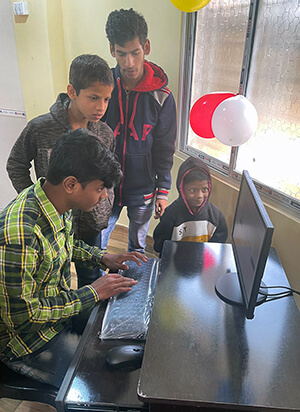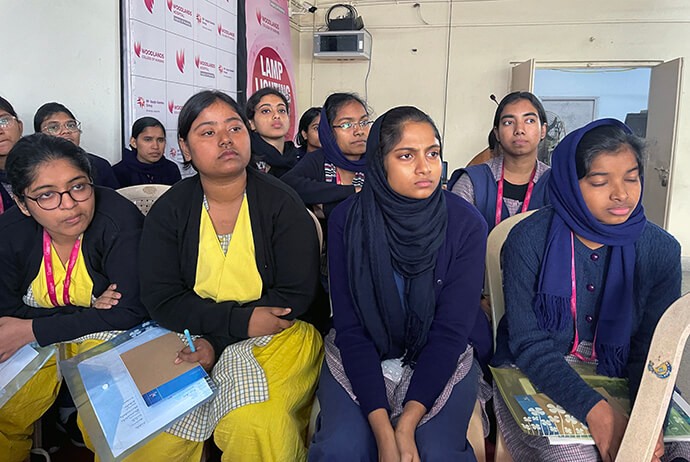Key Points:
- The National Council of Churches in India is leading efforts to revive AIDS programs overshadowed by the COVID pandemic and to advocate for gender and sexual diversity.
- During two days of seminars, participants focused on “Gender and Sexual Diversities and the Faith Communities” and “Assessing a Relevant Faith Based on HIV and AIDS Responses in Chennai.”
- Currently 2.47 million people are HIV-positive in India, with at least 66,000 new infections last year.
- “Many Christians express homophobia and experience fear when associating with HIV-positive persons,” noted Dr. N. M. Samuel, a retired Chennai medical school professor and the son of a Methodist minister.
India continues to have a high rate of HIV infection and ranks third in the world in the number of people living with HIV. In response, the National Council of Churches in India is restarting ecumenical educational efforts to engage faith communities in AIDS ministry.
“The catastrophic COVID pandemic and an urgent need to focus on gender and sexual diversity in the churches took the spotlight off HIV and AIDS in our country,” said the Rev. Asir Ebenezer, National Council of Churches in India general secretary. At conferences jointly sponsored by the Tamilnad Christian Council, the Center for Health and Hope and the NCCI, Ebenezer said, “AIDS is not over. We need to revive our programs across the nation. Our churches are everywhere; we can make a difference.”
The Rev. E. D. Yesurathnam, bishop of the Chennai Episcopal Area, Methodist Church in India, welcomed people to two days of seminars at the Methodist Educational Center in Chennai. Participants explored “Gender and Sexual Diversities and the Faith Communities” and “Assessing a Relevant Faith Based on HIV and AIDS Responses in Chennai.”

The workshops honored retired United Methodist Bishop Albert “Fritz” Mutti of Kansas City, Missouri, and his late wife, Etta Mae. Both had traveled throughout India in 2000, alerting churches and seminaries to an upcoming pandemic that had already claimed the lives of two of their sons, Tim and Fred.
In 1986, the first HIV patient was identified in India. Currently 2.47 million people are HIV-positive in India, with at least 66,000 new infections last year. Especially endangered are high-risk groups from lower, impoverished castes; transgender individuals experiencing violence; commercial sex workers; men who have unprotected sex with infected men; drug users; and married women whose partners engage in outside sexual relationships.
Dr. M. Janakiram, deputy director, Tamil Nadu State AIDS Control Society, noted that India’s epidemic is concentrated in specific groups, but at any point could shift to the wider population. India is seeking to reach the UNAIDS goal of 95/95/95 — namely 95% of those infected would know their status, 95% would receive treatment and 95% under treatment would have suppressed viral loads so they could not transmit the disease to others via sex.
“Treatment is prevention,” he emphasized, “along with proper use of condoms.”
Faith communities are adjusting to the Supreme Court of India’s 2018 decision to decriminalize consensual same-gender sexual relationships. The National Council of Churches in India has served as the educational forum for the 32 Protestant and Orthodox churches that constitute its membership. Member churches have not yet changed their policies, but the NCCI has served to champion a more inclusive church, and theological schools have authorized courses in terms of gender identity, sexual orientation and HIV education.

Christian speakers from the LGBTQ community addressed both seminars, urging the church to overcome its bias against their own members. One HIV-positive man shared how his priest had told him, “Become straight or go to hell.” Instead, he left the church. An Indian woman described living since 1995 with the virus, thanks to antiretroviral medicine provided free from the government. “But the stigma from the church and society makes life difficult,” she said.
Dr. V. Esther Kathiroli, Tamilnad Christian Council executive secretary, became involved in AIDS ministry when she joined American visitors from the Center for Health and Hope in 2002. Together, they distributed clothing gifts to patients at the Tambaram Tuberculosis Sanatorium in the Chennai suburbs.
“Women were not only dying because there were no life-giving drugs,” observed Kathiroli, “but because of stigma, women were dying alone. Females were being blamed for the crisis and rejected by their own families. One woman found comfort by having a large Bible under her pillow.”
Subscribe to our
e-newsletter
A retired Chennai medical school professor and the son of a Methodist minister, Dr. N. M. Samuel of Coimbatore, India, commended the National Council of Churches in India for daring to educate and advocate for LGBTQ persons and for reintroducing its AIDS ministry.
“Many Christians express homophobia and experience fear when associating with HIV-positive persons,” he noted.
He recalled visiting an Indian family living with HIV in a thatched-roof brick home. Village neighbors loaned the family plastic chairs for their guests on the condition that only uninfected people would use them, mistakenly believing the virus spreads by touch.
Several trans women and a gay man said they had sought to become priests but were rejected due to discrimination. One trans woman started her own church, prompting Ebenezer to speculate “whether LGBTQ+ persons in the future will want to be integrated into an inclusive church, having experienced exclusion, stigmatization and discrimination for so many years from traditional Christians.”
While in India, five volunteer members from the Center for Health and Hope visited faith-based AIDS programs financed partially by donors in the U.S. This included an AIDS orphanage for 54 vulnerable children (80% HIV positive) in Kolkata supported by the Church of North India, a free clinic for women and children living with HIV in Namakkal, and a faith-based nonprofit in Chennai that ministers to more than 30 HIV-infected families with monthly gifts of nutritional supplements.
Larry Sondergroth, a Denver, Colorado, member of the Center for Health and Hope board, hailed the leadership of the National Council of Churches in India for renewing India’s AIDS ministry and educating about gender and sexual diversity.
“Both are integral to the church’s mission of emphasizing the sacred worth of every individual,” he said. “Neither the government nor the church can end AIDS by itself, but we can help stop stigma and practice zero discrimination.”
Messer serves as executive director of the Center for Health and Hope in Centennial, Colorado, and as a member of the United Methodist Global AIDS Committee.
News media contact: Julie Dwyer, news editor, newsdesk@umcom.org or 615-742-5469. To read more United Methodist news, subscribe to the free daily or weekly Digests




